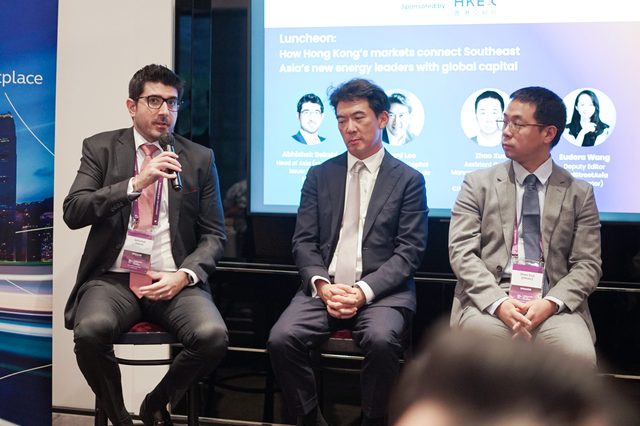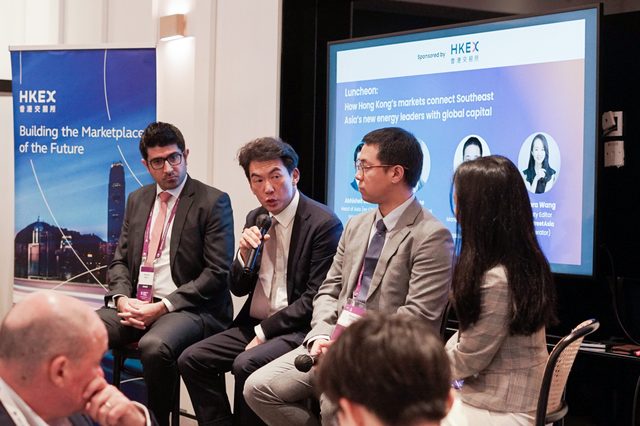Partner content in association with
HKEX “well suited” for listing of SEA new energy firms
Following the introduction of a new listing chapter last year, the HKEX is well-poised as an attractive listing venue for new energy companies amid a surge of global interest in the sector.
The new chapter, called the 18C Specialist Technology chapter, includes enhanced listing rules that enable issuers from five specific industries, including new energy and environmental protection to seek a listing on Hong Kong’s markets.
The four other industries are next-generation information technology; advanced hardware and software; advanced materials; and new food and agriculture technologies.
Abhishek Bakshi, Head of Asia (ex-China) Issuer Services at HKEX, said that the Hong Kong bourse is “well-suited” for new energy companies as reflected by the considerable number of such companies already listed at HKEX.
The exchange, Bakshi said, has approximately 75 companies from the new energy sector listed, with a combined market cap of around 1.1 trillion Hong Kong dollars. Among them are household EV companies such as Li Auto, Xpeng and BYD.
He added that HKEX attracts international investors as it is seen as “the best-in-class marketplace” with significant depth and liquidity, and one that offers investors the ability to invest in companies not just from mainland China, but also from different parts of the world.
“And by the same token, we’re the only place in the world where issuers can access both China’s onshore capital pool and the international capital pool, making Hong Kong a very special place to list in,” said Bakshi at a luncheon panel discussion titled ‘How Hong Kong’s markets connect Southeast Asia’s new energy leaders with global capital’ at the Indonesian PE-VC Summit 2024.
According to Edward Lee, HSBC’s head of equity capital markets Southeast Asia, the new rules incentivizing new energy issuers are timely. Given the growing global interest around the sector, issuers that take advantage of such adjustments and manage to go public will reap great rewards from it.
“If you are in the right sector, and there is investor appetite for that particular thematic, then you are going to get the optimal valuation that isn’t severely impacted by broader market conditions,” says Edward Lee, HSBC’s head of equity capital markets Southeast Asia.
Lee explained that among the factors for his bullishness on new energy issuers is the surge in ESG-focused investors in various capital markets, whose AUM continues to grow irrespective of cycles, economic growth and interest rates.
Address a massive funding gap in SE Asia’s go-green efforts

As one of the world’s top exchanges with 73 IPOs raising a total of HK$46.3 billion (almost US$6 billion) in 2023, the Hong Kong stock exchange aims to connect deep pools of international capital with new energy businesses from all over the world, including Southeast Asia – a region that the world’s go-green efforts are relying heavily upon due to its abundance of renewable resources and manufacturing potential.
Of all the Southeast Asian countries, Indonesia in particular is a market that is witnessing a growing energy sector and an increasing demand for capital to support it. The country has about a quarter of the world’s nickel reserves and is the second-largest cobalt producer globally, both of which are essential to the production of EV batteries.
For the Indonesia Stock Exchange (IDX), 2023 was a record year for public listings by new energy companies. IPOs in the renewable energy and nickel sector accounted for 79% of the total IPO proceeds on the IDX as of Q3 2023.
Among the new energy companies that listed last year are PT Amman Mineral Internasional Tbk that raised US$712 million, PT Trimegah Bangung Persada Tbk (Harita Nickel) that raised US$683 million and PT Merdeka Battery Materials Tbk that raised US$672 million.
Among the reasons for the uptick in the number of energy companies going public is the government’s “strategic focus” on building a green economy and the quick rise in the popularity of electric vehicles, according to Ethan Xue, Assistant General Manager, Equity Financing Department at CNGR Advanced Material, a Chinese energy company that has expanded to Indonesia.
HSBC’s Lee acknowledged the IPO success of new energy firms in Indonesia, but argued that some of these companies, particularly those with a “China nexus”, could potentially open up a new source of capital by also listing in Hong Kong though a dual listing construct.
Having this China nexus, which refers to strategic links and connections developed with the Greater China market, is very important for foreign firms looking to list in Hong Kong, Lee underlined.
“(By listing in Hong Kong) you are tapping into that additional liquidity, which can potentially be significant. But this is only relevant if you’re doing a sizable IPO,” Lee said.
Interestingly, the IDX in July last year signed an MoU with the HKEX which will see the two organizations collaborate on opportunities relating to cross-border listings in the Hong Kong and Indonesian markets, joint product development and ESG initiatives, such as the promotion of sustainable finance in Asia. This was conveniently followed by the addition of IDX as a recognized stock exchange for secondary listings in Nov 2023.
A reputation enhanced by reform

Over the best part of the past decade, HKEX has consistently been regarded as one of the top stock exchanges in the world. This owed much to a series of reforms and initiatives the bourse has undertaken.
Among the most notable were three new listing chapters introduced in April 2018, which were 18A for pre-revenue biotech companies, 8A for weighted-voting rights issuers, and 19C for secondary listings of overseas issuers.
These reforms aimed to pave the way for “new economy companies” to be able to list on HKEX by addressing obstacles that tend to come with such high-growth technology companies which are: pre-revenue, weighted-voting rights and dual-class share structures and founders’ desire to retain influence of their ideas and IP.
Since those reform chapters were delivered, 303 new economy companies have listed in Hong Kong, raising a total of HK$946.9 billion and propelling it to be ranked among the top five bourses in the world for consecutive years until 2022.
Last year, while the 73 listings and HK$46.3 billion dollars raised were not as strong as the levels seen in previous years, HKEX was still ranked sixth globally in the top 10 exchanges by volume.
Despite the impact from the continued complexity of the macroeconomic landscape, three of the big four global accounting firms – Deloitte, PwC and KPMG – all expect IPOs in Hong Kong to rebound to HK$100 billion (US$12.8 billion) in 2024 as the city reinforces its role as Asia’s premier international financial market.
About 72 IPO applications were in process by the end of 2023, as Hong Kong continues to be an attractive listing location for companies across different sectors and geographies, said Bakshi.
“The combination of the reforms and the existing pipeline gives us a lot of optimism,” he said. “We should see in 2024 and onwards some of these initiatives come into fruition.”

